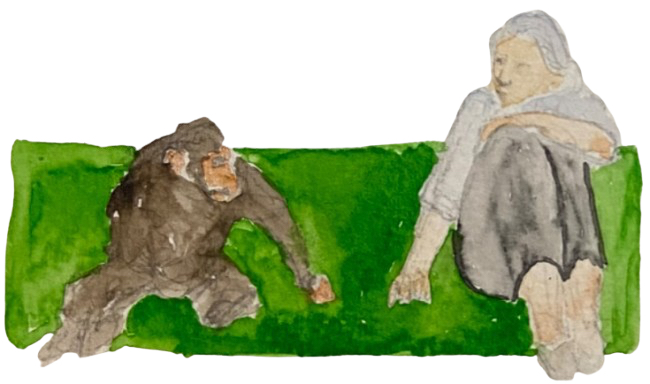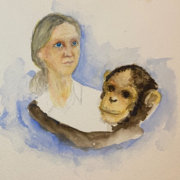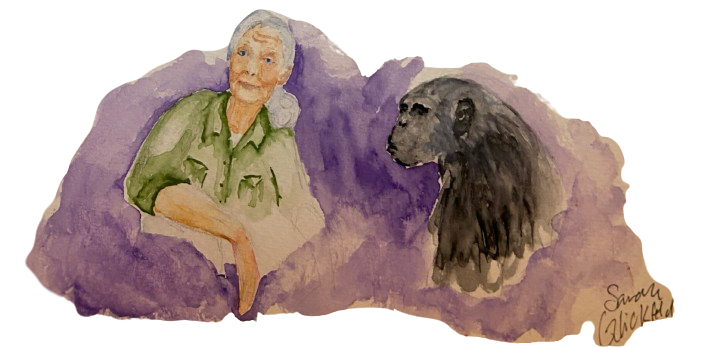The Undergraduate Anthropological Association: Remembering the Life and Legacy of Jane Goodall through the Eyes of UCLA Anthropology
Written by Caitlyn Chitwood and Mila
Mucic Art by Sarah Glickfeld
It is well known that Dr. Jane Goodall had a childhood fascination with zoological science, particularly concerning African animals. You may not know, however, that Jane did not go to college before her research led her to primatology. Instead, the famed anthropologist Louis Leakey sent Jane, his secretary of three years, to East Africa in 1960 to study primate behavior. At just twenty-six years old, she went to Tanzania to study chimpanzees – a decision that would prove life-changing. Her groundbreaking research proved that wild chimpanzees used and made their own tools, a skill that was previously believed to be a human trait only. We all know her as the celebrated primatologist, but it was her service as a conservationist and a humanitarian that would cement her place as one of the most influential people in the world.
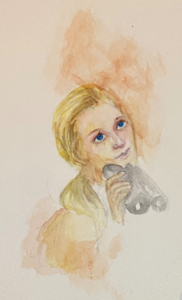
In 1986, Jane held a conference with other primatologists to discuss chimpanzee and habitat conservation. Afterwards, she stated, “I went to that conference as a scientist, planning to carry on with that wonderful life, and I left as an activist.” This comment, shared by Jane on her podcast Jane Goodall Hopecast in 2020, encapsulates the moment her career became a public, ever-lasting fight for the natural world and its inhabitants. The Jane Goodall Institute, founded in 1977, turned its attention to habitat conservation and human welfare. From 1986 until her recent passing, Jane traveled the world to address the problems and consequences of the anthropocene’s most dangerous creatures – humans. Beyond the academic talks, she worked directly with governments to enforce protective legislation and oil companies that adopted eco-friendly practices. Perhaps most important was her direct involvement with youth programs around the world.
Although her work as an activist largely took her away from a life of research in Tanzania, Jane never forgot her beloved chimpanzees. In 2013, she advocated for the release of chimpanzees that were held captive in United States’ labs for medical research. The National Institutes of Health (NIH) agreed to release the remaining chimps, the majority of which now live at Chimp Haven. Today, the Gombe Stream Research Center continues the research that Jane began 65 years ago. As we have learned more about our great ape relatives, it has become increasingly clear that the more we understand our primate relatives, the better we understand our place in this world. Her work inspires all of us to build a better world in any way we can. In 1991, Jane founded the global Roots & Shoots program to successfully inspire the youngest generations to be active participants in the fight for environmental and humanitarian protections. As an offshoot of the Jane Goodall Institute, Roots & Shoots motivates children and teens everywhere to become leaders in their communities, instilling values of leadership, compassion, and progress in participants around the world. We encourage you to explore current Roots & Shoots programs here, where you also have the opportunity to initiate your own program: ROOTS & SHOOTS: Programs.
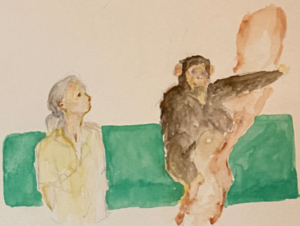
Jane passed peacefully on October 1st, 2025, just two days before she was scheduled to present at Royce Hall here at the University of California, Los Angeles. It goes without saying that Dr. Goodall had a monumental influence on the generations that succeeded her. On campus alone, there are numerous organizations dedicated to student involvement in humanitarianism, conservation, and social justice. On a more personal level, her work as a primatologist and anthropologist heavily inspired many of the students in the UCLA Department of Anthropology to study anthropology and pursue related careers. We grew up with this woman as a leader and a role model, and the time has come for us to take up the mantle. Jane dedicated her life to defending the innocent, and we should do everything in our power – as anthropologists, students, inhabitants of the earth – to continue her mission. We would like to end this tribute with a quote by Jane Goodall from 2011, as a reminder that we each have the capacity to do good and make positive change on this little blue planet we call home:
“You cannot get through a single day without having an impact on the world around you. What you do makes a difference, and you have to decide what kind of difference you want to make.”
As you explore the below quotes developed by UCLA student and faculty anthropologists, we invite you to reflect on the meaning of Jane’s career and the opportunities made possible by her and those around her.
– The Undergraduate Anthropological Association at UCLA
“… During the latter half of her life, Jane spent practically every week of the year on the road, giving public lectures. I know of no other advocate of wildlife so devoted to the cause; it must have been a terrible sacrifice for someone who loves nature as much as Jane did to spend so much time on airplanes and in hotels rather than in the wilderness. Yet she kept doing this up until the day she died, while on a public speaking tour in Los Angeles. Although it is hard to precisely measure the impact that any one person has on public attitudes and policies, I feel pretty confident that it is mainly due to Jane’s public speaking efforts that the welfare of captive chimpanzees has been improved (e.g. passing laws restricting their use in medical research, the establishing of chimpanzee “retirement centers” for former lab animals, and the creation of rehabilitation centers for chimpanzees rescued from the pet trade so they can be restored to the wild). She is also largely responsible for collaborations that improve the lives of people living near Gombe, so that they don’t need to destroy the forests where chimpanzees dwell in order to make a living.”
“Jane, I will miss you. I am planning to study primatology in the future and I hope I can make you proud!”
“Although I am unable to describe myself as one who is particularly interested in primate studies, it would be untrue to deny the significant impact the work of Jane Goodall has had on my life, both as a student and a person. Her commitment to her subjects is an inspiration for any researcher, whether they are involved with human or nonhuman, organic or inorganic. As someone with deep investments and passions regarding environmentalism and advocacy, I hope that I — along with others within UCLA anthropology and around the world — can honor the life and legacy of Dr. Goodall by bringing unique and well-researched nuance from our own fields, even when previously unrecognized, to as many people as are simply willing to listen.”
“I had tickets to see Jane’s talk at UCLA, which was scheduled for a few days after she passed. I was so excited to finally meet her, as she is one of my heroes! I see her on billboards in each city I go to, and she grew up with me as I matured from NatGeo kids to National Graphic Magazine. The loss of her as an academic and as a person was felt deeply by my community members and I, and although I think planet Earth is missing one of its best advocates, I really believe Jane’s work will continue to change the world for the better even after her passing. This applies to us as anthropologists, humans, and animal beings who are not alone in this world.”

